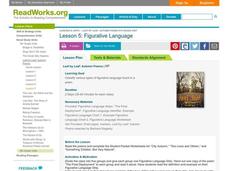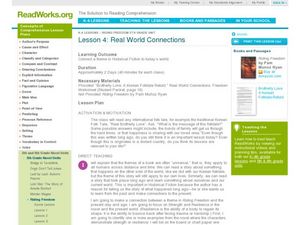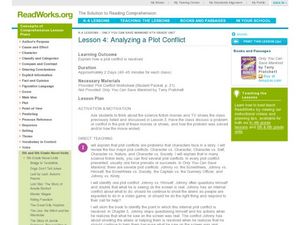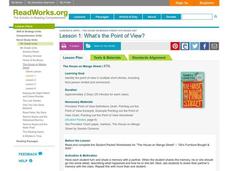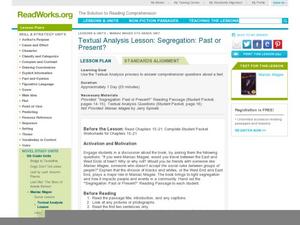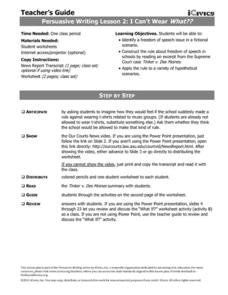Curated OER
Theme Matters
Fifth graders read to find the purpose of a piece of writing. They explore the theme of Bridge to Terabithia through events in the story. Furthermore, they consider how they would find a theme and examine a new text for its theme.
Read Works
Lesson 4:Theme Matters
Determining a theme is one of the most difficult and most important standards in the Common Core. Use this plan to help your learners identify the message that an author is sending to the reader. The lesson is based around the book Dogs...
Read Works
What's the Main Idea?
By sharing a summary about their favorite book or movie, your young readers can then discuss the main ideas of their beloved stories. The concept transitions to finding the main idea in poetry. Class members use textual clues in various...
Curated OER
Lesson 3: A Poem's Theme
Leaf by Leaf: Autumn Poems by Barbara Rogasky is the foundation of this lesson on theme identification. Critical thinkers read three different poems from the book then attempt to find the message the author is sending her readers. They...
Read Works
Figurative Language
Do your learners need to practice identifying figurative language? This activity outlines a method for working on that tricky skill. After teacher modeling and think-aloud, fourth and fifth graders identify examples of figurative...
Curated OER
Lesson 4: Theme Matters
This useful approach to determining themes based on specific details from a book is aimed at readers of Jerry Spinelli's Maniac Magee. It could also easily be adapted for use with other books or readings. The class identifies recurring...
Curated OER
Real World Connections
Explore universal themes in literature with a literacy and multicultural awareness instructional activity. Elementary and middle schoolers make real world connections between themes in books from several cultures. They make inferences...
Read Works
The Language of Setting
Examine the connection between descriptive language and emotional impact. For the first few chapters of The Lion, the Witch and the Wardrobe by C.S. Lewis, learners record the descriptive writing the author used to vivify the woods in...
Read Works
The Language of Setting
Descriptive language can be used to create a vivid and imaginative setting. Create the chart suggested in this plan to track the descriptive language found in The Wizard of Oz by L. Frank Baum. The class discusses the land beyond...
Curated OER
The Effects of Character Decisions
Learners explore characters' decisions. They play a card game in which they match a decision card with a direct effect card. Then they examine characters from The Wizard of Oz, record important decisions that they make on index cards,...
Curated OER
Deciding Theme
Read aloud to your class the fable "The Lion and the Mouse" as you explore characters' choices and the effects they have on a story. Apply what is discussed to finding a theme of the chapter "Not Giving Up" from The Wizard of Oz.
Curated OER
What's the Point of View?
What is the point of view? Sixth graders discuss third person limited and omniscient perspectives while reading several short stories. Then, complete a worksheet and share findings with peers.
Curated OER
Poetic Word Choice
Groups or pairs choose ordinary objects from a bag and rename them based on traits, so that a stapler becomes a "paper cobra." Then they connect this exercise to the way authors use language to emphasize certain traits through word...
Curated OER
Analyzing a Plot Conflict
Sixth graders analyze plot conflict with science fiction and TV programs. After discussing the conflict, they identify solutions for the programs selected. They examine Only You Can Save Mankind for conflict, and consider ways the...
Curated OER
Thinking About Theme
Writers use the literary element of conflict to develop their theme. Use the conflict between the Johnny and the ScreeWees in Terry Pratchett’s Only You Can Save Mankind to model how a major theme is revealed. The conflict between the...
Curated OER
What's the Point of View?
Sixth graders explain what a point of view is. They list two different types of examples of third person point of view and identify the difference between a third person limited and third person omniscient . Additionally, they read a...
Curated OER
Interpreting Perspective
Work on characterization with a narrative writing lesson, in which middle schoolers interpret a character's perspective. They discuss family traditions and examine how culture can influence a character's perspective. Next, they read...
Curated OER
Textual Analysis Lesson: Segregation: Past or Present?
Are your scholars reading Jerry Spinelli's Maniac Magee? If so, use this textual analysis packet and lesson guide to drive deeper thinking about the characters, create personal connections, and apply historical contexts to the text....
Curated OER
Genre Lesson: Poetry
Hook kids into a study on poetry elements by asking them to bring in the lyrics to their favorite song. Discuss the elements in one or two songs (preferably that demonstrate rhyme, figurative language, or a repeating phrase). Groups do...
Curated OER
Genre Lesson: Poetry
Here is a terrific lesson on poetry! Learners bring in the lyrics to their favorite song. A class discussion ensues regarding what makes a song "catchy." After analyzing the alliteration of the poems, learners read the poem "This...
Curated OER
Genre Lesson: Biography/Autobiography
Practice distinguishing biography from autobiography through point of view. Tell a brief story of your morning. Have a class member retell the story to you (using second person). And have another retell the story to the class (using...
iCivics
For The President, All In A Day's Work
How does the president of the United States get the authority to exercise his/her duties? What responsibilities and tasks go into a hard day's work for the president? Here is a lesson plan that includes several instructional materials...
iCivics
I Can’t Wear What?
Can schools ban t-shirts picturing musical groups or bands? Your young citizens will find out with this resource, which includes a summary of a United States Supreme Court case from the 1960s about a similar dispute over students wearing...
iCivics
Why Government?
Why do people create governments? Where did we get our ideas about government? This is a fantastic introductory lesson for your American government class that begins by reviewing the philosophies of Thomas Hobbes and John Locke in...






